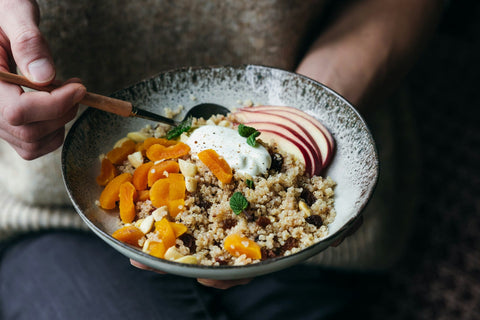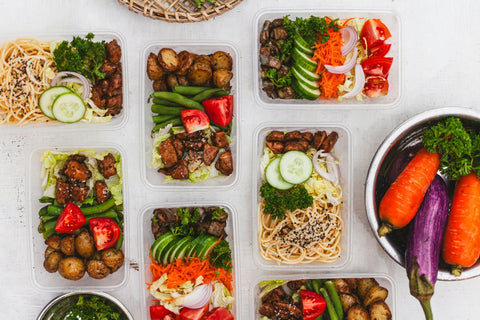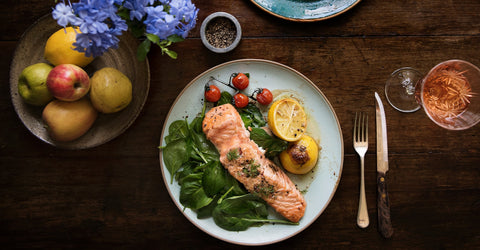Menopause brings a wave of change—physically, emotionally, and hormonally. Many women report common struggles like hot flashes, unexpected weight gain, mood swings, and bone loss.
While your physician may offer hormonal therapies or generic advice, there are lesser-known dietary choices that can support your body naturally through this transition.
These are called menopause-safe superfoods. Unlike supplements or prescriptions, these nutrient-rich, hormone-balancing foods offer gentle yet effective support. They are often missing from standard care plans but could make all the difference in how you feel day to day.
Why Nutrition Matters During Menopause
During menopause, estrogen levels decline, triggering a chain of biological changes. This hormonal shift can alter metabolism, increase body fat, weaken bones, and disturb sleep. Many women also experience brain fog, night sweats, and digestive issues.
This is why nutrition for healthy aging becomes more than just a trend—it’s a necessity. Certain nutrients may help restore balance and offer natural menopause remedies. Phytoestrogens, magnesium, fiber, and healthy fats are all essential. They support hormone metabolism, manage inflammation, and protect long-term health in a gentle, sustainable way.
6 Menopause-Safe Superfoods Your Doctor Might Not Mention
Let’s explore six surprising superfoods for hot flashes, energy, and resilience. These foods don’t just offer nutrients—they deliver targeted relief from the discomforts of menopause.
1. Seaweed
Most people never think of seaweed beyond sushi. Yet this ocean vegetable is packed with iodine, which supports thyroid health—a gland closely tied to metabolism and mood regulation. For women entering their 50s, this is key. Seaweed also contains trace minerals that may help promote natural hormone support and reduce fatigue (1).
2. Ground Flaxseeds
Tiny but mighty, flaxseeds are one of the richest sources of lignans, a form of phytoestrogen. These plant compounds can help balance estrogen naturally, possibly reducing the severity of hot flashes. Additionally, flax provides ample fiber, supporting digestion and cholesterol levels—both of which often shift during menopause (2).
3. Pumpkin Seeds
These small seeds pack a big nutritional punch. They’re rich in magnesium, which helps relax muscles, support restful sleep, and ease anxiety. Zinc, also found in pumpkin seeds, plays a role in bone strength and immune function. Together, these minerals contribute to overall menopause symptom relief (3).
4. Chia Seeds
A top pick for fiber-rich diets for seniors, chia seeds expand in liquid, helping with regularity and hydration. But their benefits go beyond digestion. Chia seeds are also an excellent source of omega-3 fatty acids, known to reduce inflammation and support cognitive health—a frequent concern for women dealing with brain fog and memory changes (4).
5. Avocados
Loaded with healthy fats, avocados are a creamy way to support skin elasticity, mood, and brain function. They also contain potassium, which helps manage fluid balance and blood pressure. Many women experience drier skin and hormonal imbalances during menopause, and avocados may offer gentle support from the inside out (5).
6. Beets
These vibrant roots are rich in nitrate compounds that improve circulation and reduce fatigue. More importantly, they assist with liver detoxification, which is crucial for hormone metabolism. When your liver processes excess estrogen and toxins efficiently, symptoms like bloating or irritability may subside (6).
Additional Lifestyle Tips for Managing Menopause Naturally
Nutrition is powerful—but it’s even more effective when paired with simple lifestyle habits. Stay hydrated by drinking plenty of water and herbal teas throughout the day. Good hydration helps with thermoregulation, especially during night sweats.
Sleep matters, too. Aim for 7–8 hours of consistent rest. Establish a routine with low lighting, reduced screen time, and perhaps a magnesium-rich evening snack.
Movement is non-negotiable. Combine weight-bearing exercises like walking or strength training with gentler practices like yoga. This supports bone density, cardiovascular health, and mental clarity.
Also, reduce or avoid inflammatory foods such as sugar, alcohol, and ultra-processed snacks. These can worsen menopause symptoms and interfere with hormonal balance. Swapping them for nutrient-rich options helps build a stronger, calmer foundation.
The Bottom Line
Menopause doesn’t have to mean discomfort, fatigue, or frustration. By incorporating these lesser-known menopause-friendly foods, you may experience significant improvements in energy, mood, and resilience. They provide real, research-supported benefits that support natural hormone support without relying on medications alone.
The best part? These foods are easy to integrate into your daily meals. A tablespoon of ground flaxseeds in a smoothie, a handful of pumpkin seeds on a salad, or a few slices of avocado with breakfast can become small but powerful rituals.
If your goal is to move through this life stage with more ease, vitality, and clarity, start with what’s on your plate. Real change doesn’t always come from prescriptions. Sometimes, it begins with food—quietly reshaping your hormones, healing your body, and helping you thrive.
References
1. Smyth PPA. Iodine, Seaweed, and the Thyroid. Eur Thyroid J. 2021 Apr;10(2):101–8.
2. Brooks JD, Ward WE, Lewis JE, Hilditch J, Nickell L, Wong E, et al. Supplementation with flaxseed alters estrogen metabolism in postmenopausal women to a greater extent than does supplementation with an equal amount of soy. Am J Clin Nutr. 2004 Feb;79(2):318–25.
3. Batool M, Ranjha MMAN, Roobab U, Manzoor MF, Farooq U, Nadeem HR, et al. Nutritional Value, Phytochemical Potential, and Therapeutic Benefits of Pumpkin (Cucurbita sp.). Plants (Basel). 2022 May 24;11(11):1394.
4. Ullah R, Nadeem M, Khalique A, Imran M, Mehmood S, Javid A, et al. Nutritional and therapeutic perspectives of Chia (Salvia hispanica L.): a review. J Food Sci Technol. 2016 Apr;53(4):1750–8.
5. Avocados can support a heart-healthy diet | NHLBI, NIH [Internet]. [cited 2025 Jul 1]. Available from: https://www.nhlbi.nih.gov/news/2022/avocados-can-support-heart-healthy-diet
6. Benjamim CJR, da Silva LSL, Sousa YBA, Rodrigues G da S, Pontes YM de M, Rebelo MA, et al. Acute and short-term beetroot juice nitrate-rich ingestion enhances cardiovascular responses following aerobic exercise in postmenopausal women with arterial hypertension: A triple-blinded randomized controlled trial. Free Radic Biol Med. 2024 Feb 1;211:12–23.


